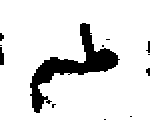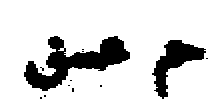page 20
CODEX OF IBN MAS'UD
'Abdallab b. Mas'ud (sometimes quoted in the sources as 'Abd Allah
and sometimes as Ibn Umm 'Abd1,
was a Companion and one of the early Muslims who could boast that
he had joined the faith earlier than 'Umar. As a youth he had herded
cattle for 'Uqba b. Abi Mu'ait and so was sometimes referred to
contemptuously as the Hudhalf slave (Tabari, Annales I, 2812).
When he became a Muslim he attached himself to the Prophet
and became his personal servant. He went on the Hijra to
Abyssinia and also to Madina and was present at both Badr
and Uhud. It was his boast that he had learned some seventy Suras
directly from the mouth of the Prophet, and tradition has it that
he was one of the first to teach Qur'an reading (Ibn Sa'd, III, I, 107).
He seems not to have been a great success when tried in an official
capacity, but at Kufa, to which the Caliph sent him, he became famous
as a Traditionist and as an authority on the Qur'an. Tradition tells
that he was one of the four to whom Muhammad advised his community
to turn for instruction in the Qur'an.2
It was doubtless his close personal contact with the Prophet
over so many years that gave such prestige to his opinions on
Sunna and Qur'an.
We have no information as to when he began to make his Codex.
Apparently he began to collect material during the lifetime
of the Prophet and worked it up into Codex form when
he was established at Kufa and was looked to as the authority
on Qur'anic matters. At any rate we find his Codex in use
there and followed by the Kufans before the official Recension
was made by 'Uthman. When 'Uthman sent to Kufa the official
copy of his standard text with orders that all other texts should
 - Nawawi, 373; Bukhari (ed. Krehl) III, 396.
- Nawawi, 373; Bukhari (ed. Krehl) III, 396.
page 21
be burned, Ibn Mas'ud refused to give up his copy, being indignant
that the text, established by a young upstart like, Zaid b. Thabit
should be given preference to his since he had been a Muslim while
Zaid was still in the loins of an unbeliever1.
There seems to have been considerable difference of opinion in Kufa
over this question of the Codex, some accepting the new text sent by
'Uthman, but a great many continuing to hold by the Codex of Ibn
Mas'ud2 which by that time
had come to be regarded as the Kufan text. The strength of the position
of his Codex in Kufa is well illustrated by the number of secondary
Codices of which some information has come down to us and which
followed the text of Ibn Mas'ud. It was from its vogue in Kufa that
his Codex came to be favoured by Shi'a circles, though one is not
disposed to accept as genuine all the Shi'a readings that are attributed
to his Codex, nor indeed those found in Sunni sources in favour of
Ahl al-Bait.
It was well known in the early days of Islam that one peculiarity
of Ibn Mas'ud's Codex was that it did not contain Suras I, CXIII,
and CXIV, i.e. the Fatiha, which is the opening prayer to
the book and the Mu'awwidhatani with which it ends. Modern
scholarship on quite other grounds holds that these were not
originally part of the Qur'an but are of the nature of liturgical
additions. That Ibn Mas'ud knew of these passages as used
liturgically is evident from the fact that we have preserved
to us notes of words in which he differed from the customary
way of reading them.
A second peculiarity equally well known was that the order
of Suras in his recension differed considerably from that of
'Uthman's recension. Two lists giving this Sura order have been
preserved to us, which do not, however, entirely agree with
one another. The earlier is that given by Ibn an-Nadim
(377)4 in the Fihrist,
p.26 (ed. Flügel) on the authority of Al-Fadi b. Shadhan (before 280),
which runs as follows:
Page 22
2, 4. 3, 7, 6, 5, 101, 9, 16,
11, 12, 17, 21, 23, 26, 37,
33, 28, 24. 8, 19, 29, 30, 36, 25, 22, 13,34, 35, 14, 47,
312, 39,
(40 bis 46)3, 40, 43, 41,
46, 45, 44, 48, 57, 594,
33, 50, 65, 49, 67, 64, 63, 62, 61, 72, 71, 58, 60,
66, 55, 53, 51, 535, 54,
69, 56, 68, 79, 70, 74, 73, 83,
80, 76, 75, 77, 78, 81, 82, 88, 87, 92, 89, 85, 84, 96, 90,
93, 94, 86, 100, 107, 101, 98, 91, 95, 104, 105, 106, 102,
97, 103, 110, 108, 109, 111, 112.
The Suras missing here are 1, 15, 18, 20, 27, 42, 99, 113, 114.
That Suras 1, 113, 114 were omitted in his Codex we have
already seen, but as variants from all the others omitted here
are found quoted from him the material of which they are
composed must have been in his Codex. Indeed they are all to
be found in the list of his Suras given in the Itqan. When we
examine these missing Suras we discover that 15 is the last in
the  series; 18 comes immediately
before the
series; 18 comes immediately
before the  Sura (19) and is
suspected to have had some connection therewith (Goossens in Der Islam XIII, 211);
20 is the sole
Sura (19) and is
suspected to have had some connection therewith (Goossens in Der Islam XIII, 211);
20 is the sole  Sura; 27 is the
Sura; 27 is the
 Sura which breaks in between
two
Sura which breaks in between
two  Suras; 42 is the
Suras; 42 is the
 Sura which breaks into the
Sura which breaks into the
 Suras, so that one may suspect
that there is something behind their omission in the Fihrist.
Yet in view of the fact that the missing Suras are in the list in
the Itqan, and the Fihrist itself expressly says that
it reckoned 110 Soras whereas there are only 105 in the list, the
probability is that the list as we have it has been defectively written.
Suras, so that one may suspect
that there is something behind their omission in the Fihrist.
Yet in view of the fact that the missing Suras are in the list in
the Itqan, and the Fihrist itself expressly says that
it reckoned 110 Soras whereas there are only 105 in the list, the
probability is that the list as we have it has been defectively written.
The second list is in the Itqan of as-Suyuti (ed. Calcutta,
Page 23
p.151), quoting from Ibn Ashta a statement going back to Jarir
b. 'Abd al-Hamid (188), who related traditions from al-A'mash
and others of Ibn Mas'ud's school1.
This list runs:
2, 4, 3, 7, 6, 5, 10, 9, 16, 11, 12, 18, 17, 21, 20, 23, 26,
37, 33, 22, 28, 27, 24, 8, 19, 29, 30, 36, 25, 15, 13, 34.
35, 14, 38, 47, 31, 39, 40, 43, 41, 42, 46, 45, 44, 48, 59,
32, 65, 68, 49, 67, 64, 63, 62, 61, 72, 71, 58, 60, 66, 55,
53, 52, 51, 54, 56, 79,70, 74, 73, 83, 80, 76, 77, 75, 78,
81, 82, 88, 87, 92, 89, 85, 84, 96, 90, 93, 86, 100, 107,
101, 98, 91, 95, 104, 105, 106, 102, 97, 99, 103, 110,
108, 109, 111, 112, 94.
here we find missing besides the expected 1, 113, 114, the
Suras 50, 57, 69, for whose omission no reason can be suggested
save that they may have dropped out by scribal error. Well
known variants are quoted from each of them and they are all
in the list in the Fihrist. The two lists correspond
sufficiently closely for us to supply the missing members of
the one from the other, and we may treat them as variants of
a common tradition as to the Sura order in Ibn Mas'ud's Codex.
The value of this tradition is another matter2.
It is not a priori likely that the arrangement of material in
any of the rival Codices would have followed the same combination
into Suras as in the text established for 'Uthman by Zaid b. Thabit.
In the accounts of that official Recension we find bits of material
coming in and the Committee considering the most appropriate
place to put them, and it is against all probability that the
composite Suras made up of bits of Meccan and bits of Madinan
material, of very different date and provenance, would have been
fitted in exactly the same way by different collectors. Neither
is it likely that the different collectors would have chosen the
same titles for the Suras. The traditions as to the Sura order,
in the case of this and of other of the Old Codices, come from
persons who were familiar with the 'Uthmanic Sura order, but
knew that the material was differently disposed in the other
Page 24
Codices and so constructed a Sura list to express the
difference1.
The variant readings which follow are necessarily arranged
according to the order of the present official text. Sometimes in
the sources the variant is expressly said to come from the Codex
of Ibn Mas'ud. More often, it is merely, given as a reading (harf
or qira'a) of Ibn Mas'ud. Occasionally also readings
are given as coming from the Companions of Ibn Mas'ud, but as
these observations represent the tradition as to his text
they are included here. In view of the great importance of
the readings of Ibn Mas'ud and Ubai, all readings from them
that survive are included in the lists even where they do not
depend on a different consonantal text from that of 'Uthman.
It has also seemed worth while to note the places where they
are specially recorded as supporting the textus receptus.
Suras 1 - 2
Suras 3 - 5
Suras 6 - 8
Suras 9 - 11
Suras 12 - 14
Suras 15 - 19
Suras 20 - 25
Suras 26 - 31
Suras 32 - 40
Suras 41 - 50
Suras 51 - 60
Suras 61 - 70
Suras 71 - 92
Suras 93 - 114
Table of Contents
More on the Qur'an
Answering Islam Home Page
![]() - Nawawi, 373; Bukhari (ed. Krehl) III, 396.
- Nawawi, 373; Bukhari (ed. Krehl) III, 396. which, as Schwally notes, is confirmed by the
Itqan.
which, as Schwally notes, is confirmed by the
Itqan.